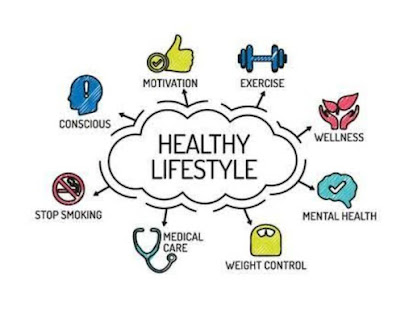Healthy life style
Living a healthy lifestyle is essential for overall well-being and can contribute to a longer, happier life. Here are some key components of a healthy lifestyle:
- Balanced Diet: Maintain a well-rounded diet that includes a variety of fruits, vegetables, whole grains, lean proteins, and healthy fats. Limit processed foods, sugary snacks, and beverages high in sugar or artificial additives.
- Regular Exercise: Engage in physical activity most days of the week. Aim for a combination of cardiovascular exercise (such as brisk walking, jogging, or cycling) and strength training (using weights or bodyweight exercises). Find activities you enjoy to make it easier to stay consistent.
- Sufficient Hydration: Drink an adequate amount of water throughout the day to keep your body hydrated. The general recommendation is to consume at least 8 glasses (64 ounces) of water per day, but individual needs may vary.
- Adequate Sleep: Get enough quality sleep on a regular basis. Most adults require 7-9 hours of sleep each night to function optimally. Establish a consistent sleep routine and create a sleep-friendly environment by minimizing noise, light, and electronic devices before bedtime.
- Stress Management: Develop healthy coping mechanisms to manage stress effectively. This may include practicing relaxation techniques like deep breathing, meditation, or engaging in activities you find calming and enjoyable.
- Limit Alcohol and Avoid Smoking: Moderate alcohol consumption, if any, and avoid smoking or using tobacco products. Excessive alcohol intake and smoking have significant negative effects on overall health and can lead to various diseases.
- Maintain a Healthy Weight: Strive to maintain a healthy weight by balancing your caloric intake with physical activity. Consult with a healthcare professional to determine an appropriate weight range for your body type.
- Regular Health Check-ups: Schedule regular check-ups with your healthcare provider for preventive care. Screenings, vaccinations, and early detection of potential health issues are important for maintaining a healthy lifestyle.
- Mental and Emotional Well-being: Prioritize mental and emotional well-being by engaging in activities that promote relaxation, self-care, and positive relationships. Practice mindfulness, seek social support, and consider professional help when needed.
- Limit Sedentary Behavior: Minimize prolonged sitting or inactivity by incorporating movement throughout the day. Take regular breaks from sitting, stand up and stretch, and consider using a standing desk if possible.
Remember that adopting a healthy lifestyle is a gradual process. Start by making small, sustainable changes and gradually build upon them. It's also helpful to seek support from friends, family, or professionals when needed.



Comments
Post a Comment